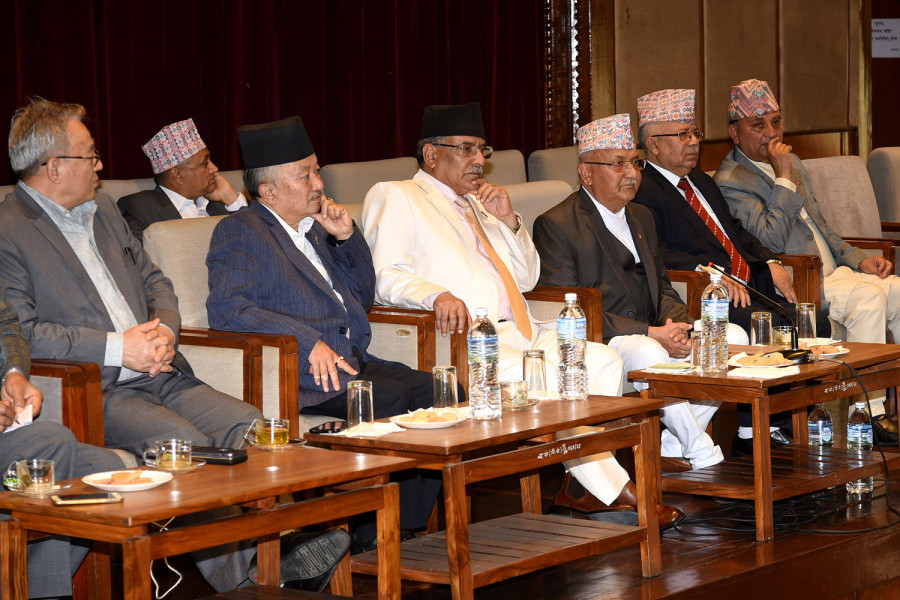Politics
After a brief respite, ruling party sees turmoil again
Bamdev Gautam has increasingly been acting as an interlocutor between former UML leaders.
Anil Giri
Though things might appear to have calmed down, party insiders say there is still turbulence within the ruling Nepal Communist Party. One manifestation of this ongoing churning has been a failure to appoint the heads of the party’s various departments.
An informal meeting of former UML leaders in the party on Wednesday failed to select the heads of several party departments after a dispute arose between Prime Minister and party Co-chair KP Sharma Oli and senior party leader Madhav Kumar Nepal. Oli had proposed Bishnu Rimal, Goma Devkota and Mahesh Basnet to lead the labour, women and youth departments, respectively. But Nepal disagreed, said one ruling party leader. The party has also failed to select the leadership for other important departments like organisation, school, and foreign.
“This is the result of a churning inside the party,” said party leader Ghanshyam Bhusal.
A major catalyst to this ongoing tension within the party has been the role of senior party leader Bamdev Gautam, who was once in Co-chair Pushpa Kamal Dahal’s camp but has now come over to Oli’s side, according to Bhusal.
Gautam had distanced himself from Oli after his election defeat from Bardiya in 2017, but now, Gautam is acting as a go-between in an attempt to bring all former CPN-UML leaders together as the rift between the UML and the former Maoists continues to widen in the newly unified party.
“Gautam seems to have realised he can gain much more from Oli than from Dahal,” said Surya Thapa, a central committee member.
While some in the party believe that Nepal should be next in line for the party chairmanship, the distance between Nepal and Oli will not allow this to happen, say party insiders. Instead, there is an ongoing attempt to bring Gautam in Parliament, likely from Kaski.
Gautam’s interlocution is crucial for Oli, who hopes to bring together all former UML leaders under its former ideology of “people’s multiparty democracy”.
“Almost all party leaders were groomed under the principle of ‘people’s multiparty democracy’ so there is no alternative to it,” said Thapa. “Some of Gautam’s recent writings say that people’s multiparty democracy is a binding force for us.”
Party spokesperson Narayan Kaji Shrestha too said that the former UML leaders were attempting to come together under the ideology of “people’s multiparty democracy”. Shrestha is from the former Maoist party that has long been advocating for “21st-century people’s democracy” as the party’s guiding ideology. The Nepal Communist Party currently operates under “people’s democracy”, a middle-ground between the two opposing claims.
But alongside Gautam, President Bidha Devi Bhandari has also been playing an active role in attempting to bring together the top leadership of the ruling party, particularly the former UML leaders, according to party leaders.
Both Gautam and Bhandari are Oli’s attempts to pursue a plan ‘B’, after his initial plan ‘A’ failed, said Bhusal.
Though the former UML and Maoists had announced their merger in May last year, the unification process has yet to complete, primarily due to differences among leaders who came from different schooling. Many party leaders believe the two parties had united technically and not organically.
Bhusal, an ideologue of the then UML, has been consistently critical of Oli and party co-chair Dahal. On more than one occasion, he has said publicly that the unification was the result of the two leaders’ “lust for power”.
Oli, who remained in the shadows for most of his political career, emerged as a strongman following his party’s victory in the elections and the subsequent merger with the Maoist party, which has almost been swallowed by the former UML.
Oli’s leadership of both the government and the party had made it difficult for Dahal, who is in search of space and responsibility. Dahal’s manoeuvrings, however, have prompted Oli to change his working style, according to party insiders.
“Oli had formed a roadmap to run the party and government, but it has failed,” said Bhusal. “His roadmap has failed to produce results. So Oli is mulling option B., But that plan B should ensure that the party is run on the basis of collective leadership.”
If any plan is formulated, it should be workable and it should be based on clear and open democratic principles, he said.




 19.12°C Kathmandu
19.12°C Kathmandu















